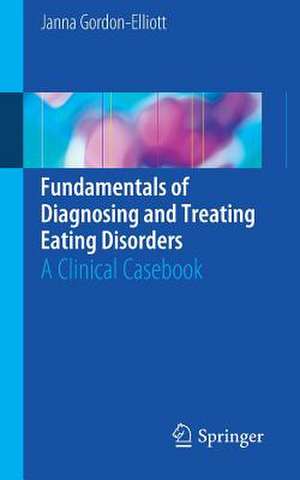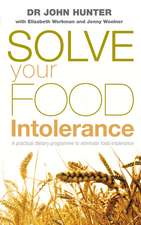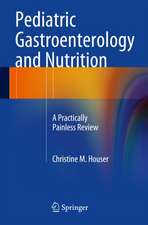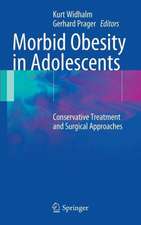Fundamentals of Diagnosing and Treating Eating Disorders: A Clinical Casebook
Autor Janna Gordon-Elliotten Limba Engleză Paperback – 24 noi 2016
This concise text contains clinical cases covering different types of dysfunctional eating with a focus on the eating disorders in the DSM-5, including the new disorder Avoidant-Restrictive Food Intake Disorder (ARFID). Each case will follow the format of clinical presentation, diagnosis, discussion, and suggested readings. The discussion sections will prioritize treatment and management, with practical tips for clinicians. The text will also include boxed “quick snapshots” with important fundamentals that are relevant to the case and the diagnosis or diagnoses being presented. Presentations that are common in clinical practice, but that may not fit neatly into one specific diagnostic category, will also be reviewed, with guidance on principles of assessment, prioritization of problems, formulation, and management. The book encourages the consideration of comorbidities and differential diagnosis. The structure of the book’s content will give readers a head-start in honing their differential diagnosis skills in the area of eating disorders. The book is split into three categories, based on the most immediately visible features of the case: I. The person who eats too little, II. The person who eats too much, III. The person who eats in an odd or idiosyncratic way. For teaching purposes, several of the cases describe a “not normal” eating presentation that are not classified within one of the current definitions of a psychiatric disorder.
Fundamentals of Diagnosing and Treating Eating Disorders is aimed at psychiatrists, primary care physicians, and other clinicians who may see patients with eating disorders.
Preț: 579.85 lei
Preț vechi: 610.38 lei
-5% Nou
Puncte Express: 870
Preț estimativ în valută:
110.95€ • 116.26$ • 91.72£
110.95€ • 116.26$ • 91.72£
Carte tipărită la comandă
Livrare economică 11-25 aprilie
Preluare comenzi: 021 569.72.76
Specificații
ISBN-13: 9783319460635
ISBN-10: 3319460633
Pagini: 109
Ilustrații: X, 159 p.
Dimensiuni: 127 x 203 x 9 mm
Greutate: 0.18 kg
Ediția:1st ed. 2017
Editura: Springer International Publishing
Colecția Springer
Locul publicării:Cham, Switzerland
ISBN-10: 3319460633
Pagini: 109
Ilustrații: X, 159 p.
Dimensiuni: 127 x 203 x 9 mm
Greutate: 0.18 kg
Ediția:1st ed. 2017
Editura: Springer International Publishing
Colecția Springer
Locul publicării:Cham, Switzerland
Cuprins
Arlene, an anxious young woman.- Becky’s body worries.- Cassandra, the college student.- Danny, the picky eater.- Eric, the hopeful Olypian.- Francine’s insulin issues.- Ginny, the secret eater.- Hannah’s troubles.- Ian, the guilty eater.- James, the inconsistent eater.- Kendra’s social anxiety.- Lisa, overweight but undernourished.- Mimi, the quiet little girl.- Nilda’s food allergies.- Olive, the healthy eater.- Peter, healthy weight but unhealthy.
Recenzii
“The purpose was to create a brief but comprehensive and approachable learning tool for those looking to become more confident in caring for patients with feeding and eating disorders. The book is suitable for learners at various stages of clinical training who are looking for an introduction to the basic clinical considerations in the diagnosis and treatment of patients with feeding and eating disorders. … a great choice for learners looking to enhance their basic knowledge and differential diagnostic skills!” (Alexandra E. Hedberg, Doody's Book Reviews, March, 2016)
Notă biografică
Janna S. Gordon-Elliott, M.D.
Assistant Professor of Clinical Psychiatry
Assistant Attending in Psychiatry
Chief, Consultation-Liaison Psychiatry Service
Weill Cornell Medicine/New York-Presbyterian Hospital New York, NY USA
Textul de pe ultima copertă
This concise text contains clinical cases covering different types of dysfunctional eating with a focus on the eating disorders in the DSM-5, including the new disorder Avoidant-Restrictive Food Intake Disorder (ARFID). Each case will follow the format of clinical presentation, diagnosis, discussion, and suggested readings. The discussion sections will prioritize treatment and management, with practical tips for clinicians. The text will also include boxed “quick snapshots” with important fundamentals that are relevant to the case and the diagnosis or diagnoses being presented. Presentations that are common in clinical practice, but that may not fit neatly into one specific diagnostic category, will also be reviewed, with guidance on principles of assessment, prioritization of problems, formulation, and management. The book encourages the consideration of comorbidities and differential diagnosis. The structure of the book’s content will give readers a head-start in honing their differential diagnosis skills in the area of eating disorders. The book is split into three categories, based on the most immediately visible features of the case: I. The person who eats too little, II. The person who eats too much, III. The person who eats in an odd or idiosyncratic way. For teaching purposes, several of the cases describe a “not normal” eating presentation that are not classified within one of the current definitions of a psychiatric disorder.
Fundamentals of Diagnosing and Treating Eating Disorders is aimed at psychiatrists, primary care physicians, and other clinicians who may see patients with eating disorders.
Caracteristici
A case-based, practical guide to the diagnosis, treatment, and management of dysfunctional eating. Book divided into three categories based on presentation to provide the reader a head-start in the establishment of a differential diagnosis. Includes a disorder new to DSM-5: Avoidant-Restrictive Food Intake Disorder (ARFID). Written by expert in the field Includes supplementary material: sn.pub/extras








